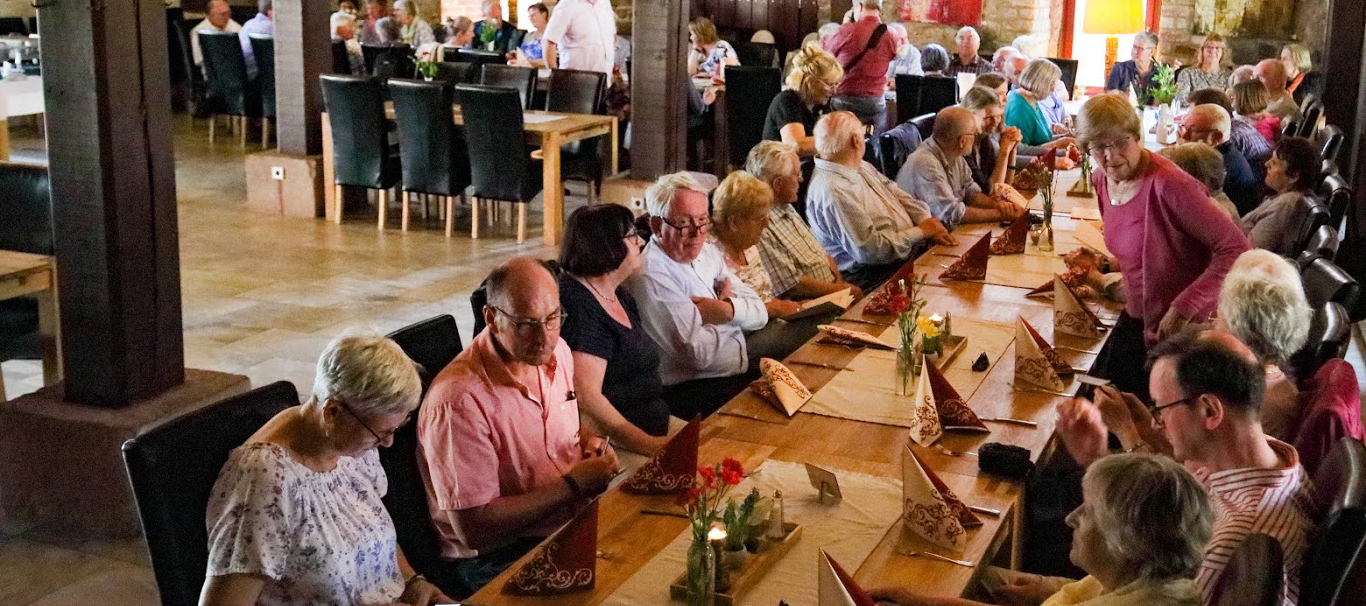
The parish of St Barnabas with Christ Church recently visited their link parish in our partner Diocese of the Evangelical Church of Central Germany. One of the participants, Robin Sykes tells us about their visit:
On the first evening, 50 of us gathered together in StJosefs from St Barnabas, St Paulus, Christ Church, St Laurentius and friends. We had an evening full of renewed friendships,Gemutlichkeit, beer and Wein, Wurst and potato salad like you can get nowhereelse, strawberry Kuchen and of course prayer, Psalmen, songs and Hymnen intruely gemischt languages. The Spirit of Pentecost was upon us.
 After Gottesdienst in St Paulus on Sunday morning, wetravelled out to the peaceful countrysideand in Althaldensleben we found a double-church, Catholic at one end andProtestant at the other, sharing a common tower in the middle. The story goesthat when both congregations needed a new church, the local agnostic tobacconist,anxious not to loose the passing trade of either, did his best to bring theconfessions together by gifting them this Doppelkirche. But they remaingetrennt, separated by a common wall. As Auden wrote:
After Gottesdienst in St Paulus on Sunday morning, wetravelled out to the peaceful countrysideand in Althaldensleben we found a double-church, Catholic at one end andProtestant at the other, sharing a common tower in the middle. The story goesthat when both congregations needed a new church, the local agnostic tobacconist,anxious not to loose the passing trade of either, did his best to bring theconfessions together by gifting them this Doppelkirche. But they remaingetrennt, separated by a common wall. As Auden wrote:
Perhaps He frowns, perhaps He grieves,
But it seems idle to discuss
If anger or compassion leaves
The bigger bangs to us[1]
 Monday saw us exploring themagnificent new Dommuseum Ottonianum, where there was much about our very ownEdith (910 -946), who as a young girl travelled the length of the Saxon worldfrom Wessex to Magdeburg to marry an ambitious ruler called Otto. She was thegranddaughter of Alfred the Great and sister of St Eadburh. Edith was devotedtoher ancestor, St Oswald ofNorthumbria (604-642), and introduced his cult into Germany after her marriage.These saintly connections may have persuaded Otto, around 640, to turn towardsthe Catholic church as a way ofconsolidating his power, a policy that would eventually lead to the DiplomaOttonianum (962), by which the Diocese of Magdeburg was created, Pope John XII confirmed as head of thespiritual church and Otto as its secular protector, emperor of Germany andItaly, and founder of the Holy RomanEmpire, an institution that would last 900 years.
Monday saw us exploring themagnificent new Dommuseum Ottonianum, where there was much about our very ownEdith (910 -946), who as a young girl travelled the length of the Saxon worldfrom Wessex to Magdeburg to marry an ambitious ruler called Otto. She was thegranddaughter of Alfred the Great and sister of St Eadburh. Edith was devotedtoher ancestor, St Oswald ofNorthumbria (604-642), and introduced his cult into Germany after her marriage.These saintly connections may have persuaded Otto, around 640, to turn towardsthe Catholic church as a way ofconsolidating his power, a policy that would eventually lead to the DiplomaOttonianum (962), by which the Diocese of Magdeburg was created, Pope John XII confirmed as head of thespiritual church and Otto as its secular protector, emperor of Germany andItaly, and founder of the Holy RomanEmpire, an institution that would last 900 years.
 The day ended with our hostsmarvellous Posaunenchor (Brass Band) playing their own arrangements of LastNight of the Proms favourites, including Land of Hope and Glory and RuleBritannia, whilst we all enjoyed a Barbecue inevitably cooked in the rain.
The day ended with our hostsmarvellous Posaunenchor (Brass Band) playing their own arrangements of LastNight of the Proms favourites, including Land of Hope and Glory and RuleBritannia, whilst we all enjoyed a Barbecue inevitably cooked in the rain.
The next day we visited Leipzig,accompanied by Michael Bartels, the retired Pfarrer of St Laurentius. In the1980s Michael was University Chaplain in Leipzig and one of five priests whoplayed a prominent role in the events that led to the ending of the GDR. Pressureof numbers had led the priests to move the Universitys Monday Prayers forPeace to the nearby Nicholaikirche which, by the autumn of 89 had acquired asubstantial following of people seeking freedom: consequently members of theMinistry of State Security, the Stasi, also attended to watch, report andarrest. On the night of 9 September, there were over 2000 peoplein the church including 600 members of the Stasi. As usual they heard a sermonbased on the Beatitudes. Where else would the Stasi hear this? After the Bishopsblessing, the people left to be greeted by 10,000 people outside the churchcarrying candles and surrounded by regular troops and military brigades. The candleswere shared with the troops who became engaged in debate. Eventually military discipline dissolved. You will succeed, notby military power, or by your own strength, but by my spirit, says the Lord.[2] That night there was no riots, no violence, not a single shop window wasbroken, but the GDR fell. Horst Sindermann, a member of the central committeeof the GDR said, We had prepared foreverything, But not for prayers and candles.
To our hosts, the EU is principallyan organisation that preserves and expands the freedoms they won that night. Iwas asked, What is your church doing to help?
Our final Eucharist on Wednesday wasa moving ceremony at the end of which we stood in an unbroken circle, Catholicand Protestant, British and German, all mixed together durcheinander. PfarrerSimon preached in the kind of mixed-up language which has influenced parts ofthis note and which provides the basis for many easy-going conversations. You didntneed to speak German to understand Pfarrer Simons sermon. His sermon and Michaelshistory reminded us that in the power of Christ, even the seemingly impossiblecan happen.
[1]From the poem Fridays Child
[2]Zechariah 4:6

